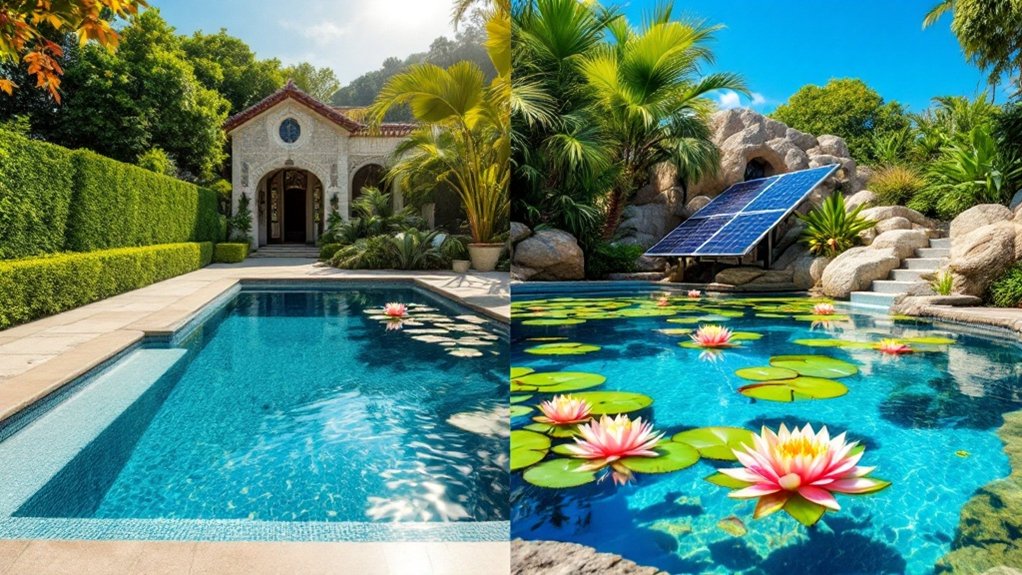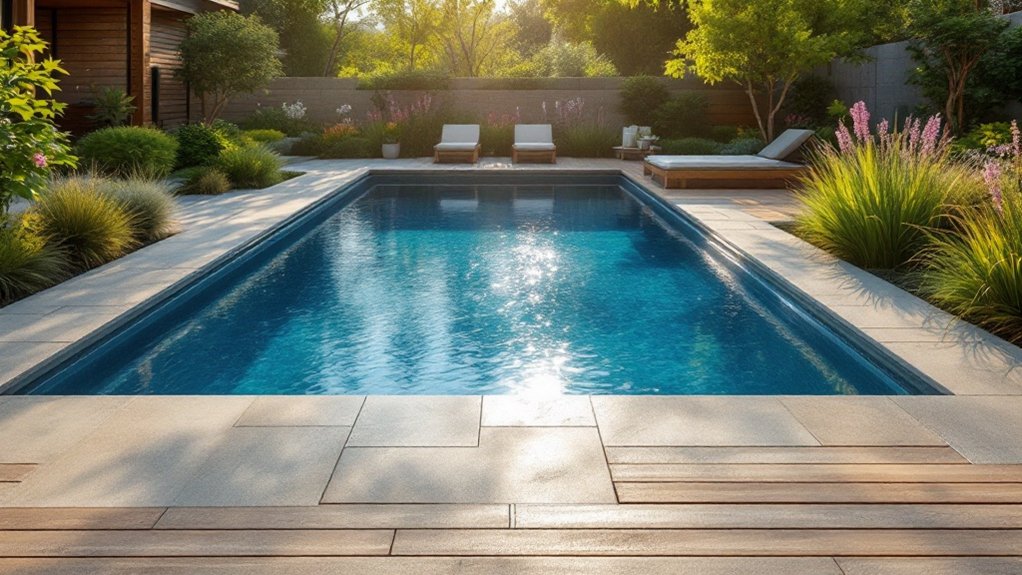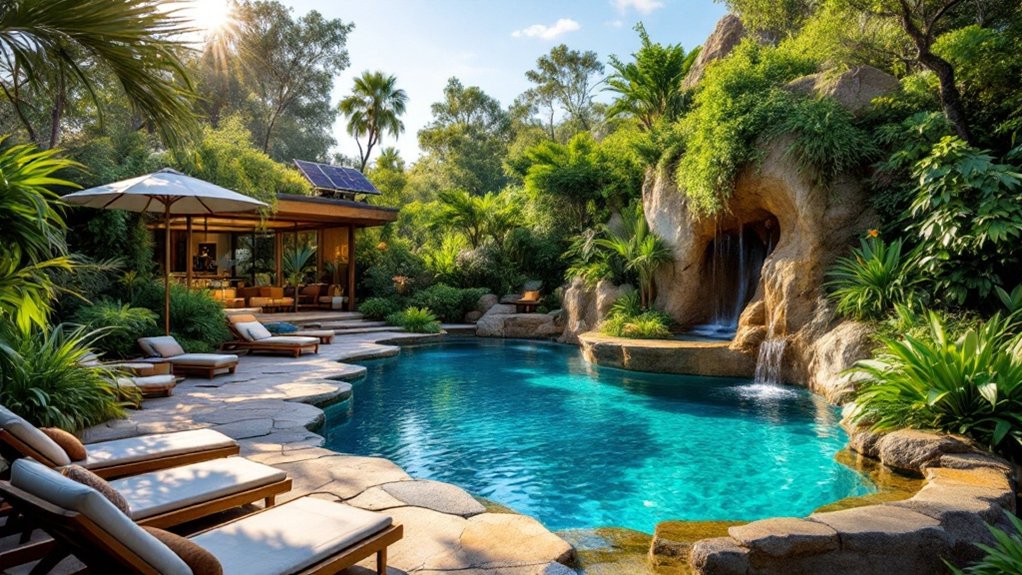Sustainable pool designs are becoming increasingly relevant in today’s environmentally conscious market. These designs focus on energy-efficient heating solutions that minimize ecological impact while maintaining comfort. Options like solar heating systems and heat pumps provide homeowners with effective ways to reduce energy costs. However, the journey towards creating an eco-friendly pool involves more than just heating. Understanding the full range of sustainable practices is essential for maximizing benefits. What else must be considered for a truly sustainable pool?
The Importance of Sustainable Pool Design
Although many homeowners desire aesthetically pleasing pools, the significance of sustainable pool design cannot be overstated. Sustainable pool design integrates environmental responsibility with aesthetic appeal, ensuring that pools contribute positively to their surroundings. By utilizing eco-friendly materials, efficient water management systems, and native landscaping, sustainable pools minimize ecological impact. These designs promote water conservation, reduce chemical use, and enhance energy efficiency, ultimately leading to lower maintenance costs. Additionally, sustainable pools can enhance property value and aesthetic charm, attracting environmentally conscious buyers. The focus on sustainability is not just a trend; it reflects a growing awareness of environmental issues. Within this framework, thoughtful design choices can create inviting spaces that coexist harmoniously with nature, offering enjoyment while preserving ecological integrity for future generations. Regular service and maintenance of these pools are essential to ensure water quality maintenance and extend the lifespan of equipment, further promoting sustainable practices.
Energy-Efficient Heating Options for Pools
How can homeowners enjoy their pools year-round without excessive energy costs? Energy-efficient heating options provide effective solutions for maintaining comfortable water temperatures while minimizing energy consumption. Electric heat pumps are popular, utilizing ambient air to heat water efficiently, making them ideal for moderate climates. Additionally, gas heaters offer quick heating capabilities, suitable for those who desire immediate warmth, although they may consume more energy. Another option is a heat exchanger, which uses existing heating systems to warm the pool, effectively enhancing overall efficiency. Each of these systems can considerably reduce energy bills and environmental impact when paired with proper insulation and pool covers, ensuring prolonged heat retention. Homeowners can choose the best system based on their preferences and location. Proper gas pool heater installation is essential to ensure safety and efficiency, as it complies with local building codes and regulations.
Solar Pool Heating Systems
Solar pool heating systems offer an environmentally friendly and cost-effective solution for maintaining warm water temperatures in residential pools. These systems harness solar energy through panels, which capture sunlight and convert it into heat. The heated water is then circulated back into the pool, extending the swimming season without relying on traditional fossil fuels. Installation can be straightforward, often integrating seamlessly with existing pool systems. Additionally, solar heating reduces energy bills and lowers the carbon footprint associated with pool maintenance. With minimal operational costs and long-lasting benefits, solar pool heating systems represent a sustainable choice for homeowners seeking efficient and eco-friendly solutions to enhance their pool experience. This approach promotes a greener lifestyle while enjoying the comfort of warm water.
Heat Pumps: A Sustainable Choice
Heat pumps have emerged as a highly efficient and sustainable option for pool heating, offering significant energy savings compared to traditional heating methods. They operate by transferring heat from the air or ground into the pool water, utilizing a small amount of electricity to do so. This process allows heat pumps to generate multiple units of heat for every unit of energy consumed, resulting in a lower carbon footprint. Additionally, heat pumps function effectively in various climates, providing year-round heating capabilities. Their durability and low maintenance requirements further enhance their appeal as a long-term investment. By choosing heat pumps, pool owners not only reduce energy costs but also contribute to a more sustainable environment, aligning with contemporary eco-friendly practices. Regular inspections of the heater fan motor can further optimize the efficiency of heat pumps, ensuring consistent heating performance.
Pool Covers and Their Energy-Saving Benefits
While many pool owners seek ways to enhance their energy efficiency, pool covers stand out as a practical solution with significant energy-saving benefits. By reducing evaporation, these covers help maintain water temperature, resulting in less energy consumption by heating systems. Moreover, they minimize heat loss during cooler nights and windy conditions, allowing pools to retain warmth for longer periods. This not only conserves energy but also reduces heating costs, making pool ownership more economical. Additionally, pool covers serve as a barrier against debris, reducing the need for cleaning and maintenance. Overall, integrating pool covers into pool management strategies can lead to substantial energy savings and contribute to a more sustainable approach to pool ownership.
Incorporating Renewable Energy Sources
Incorporating renewable energy sources into pool designs considerably enhances sustainability. Solar heating systems and geothermal energy solutions offer efficient alternatives for maintaining ideal water temperatures while reducing environmental impact. By integrating these technologies, pool owners can enjoy both comfort and energy savings.
Solar Heating Systems
As homeowners seek eco-friendly alternatives for their pools, solar heating systems have emerged as a popular choice, harnessing the sun’s energy to maintain comfortable water temperatures. These systems utilize solar panels to collect heat from sunlight, which is then transferred to the pool water. Typically installed on rooftops or in open areas, solar collectors are designed to maximize sun exposure and energy efficiency. The advantages of solar heating include reduced energy costs and minimal environmental impact, as they rely on renewable resources. Additionally, many systems can be integrated with existing pool setups, allowing for an easy shift to greener technology. By opting for solar heating, homeowners can enjoy their pools year-round while contributing to a sustainable future.
Geothermal Energy Solutions
Many homeowners are increasingly turning to geothermal energy solutions as a sustainable alternative for heating their pools. This method utilizes the stable temperature of the earth beneath the surface, making it an efficient and eco-friendly choice. Geothermal heat pumps circulate fluid through underground pipes, absorbing heat during colder months and releasing it to warm the pool. This system not only reduces reliance on fossil fuels but also minimizes energy costs over time. Additionally, geothermal systems have a long lifespan and require minimal maintenance, further enhancing their appeal. As awareness of environmental issues grows, homeowners are recognizing the long-term benefits of integrating geothermal energy into their pool designs, promoting both sustainability and comfort.
Maintenance Tips for Sustainable Pools
Although maintaining a sustainable pool may seem challenging, adopting a few simple practices can greatly enhance its efficiency and longevity. Regularly checking and balancing water chemistry is essential, as it prevents algae growth and reduces the need for harsh chemicals. Incorporating a skimmer and regularly cleaning filters helps maintain water clarity and reduces energy consumption. Utilizing a solar cover when the pool is not in use minimizes heat loss and evaporation, further conserving energy. Additionally, scheduling routine inspections of heating systems guarantees peak performance and longevity. Encouraging natural landscaping around the pool can also boost sustainability by reducing chemical runoff. By following these maintenance tips, pool owners can enjoy a cleaner, more efficient, and environmentally friendly swimming environment. Regular pipe cleaning improves water circulation and helps maintain a safe swimming environment.
Frequently Asked Questions
What Materials Are Best for Sustainable Pool Construction?
The question of materials for sustainable pool construction involves considering options like recycled concrete, natural stone, and responsibly sourced wood. These materials enhance durability while minimizing environmental impact, promoting a greener approach to pool building.
How Does Pool Design Impact Local Wildlife?
The design of pools greatly affects local wildlife by disrupting natural habitats, altering water flow, and introducing chemicals. Thoughtful designs can mitigate these impacts, promoting biodiversity and creating harmonious interactions between human recreation and local ecosystems.
Are There Grants Available for Sustainable Pool Projects?
Many organizations and government programs offer grants for sustainable projects, including pool designs. Interested individuals should research local, state, and federal resources to identify available funding opportunities that support eco-friendly initiatives in their communities.
How Can I Incorporate Landscaping Into My Pool Design?
Incorporating landscaping into pool design enhances aesthetics and functionality. Thoughtful placement of plants, stones, and pathways can create a harmonious environment, providing shade, privacy, and a natural feel, while complementing the pool’s overall appearance.
What Are the Long-Term Cost Savings of Sustainable Pools?
The long-term cost savings of sustainable pools typically arise from reduced energy and maintenance expenses. By utilizing efficient systems and materials, owners can expect significant decreases in utility bills and overall operational costs over time.
Conclusion
To summarize, sustainable pool designs that incorporate energy-efficient heating solutions, such as solar heating systems and heat pumps, greatly enhance environmental responsibility. By embracing eco-friendly materials and innovative water management strategies, these pools not only conserve resources but also elevate the aesthetic and market value of properties. As more homeowners prioritize sustainability, investing in such designs becomes a forward-thinking choice that aligns with a commitment to environmental stewardship while enjoying the benefits of a beautiful outdoor space.




